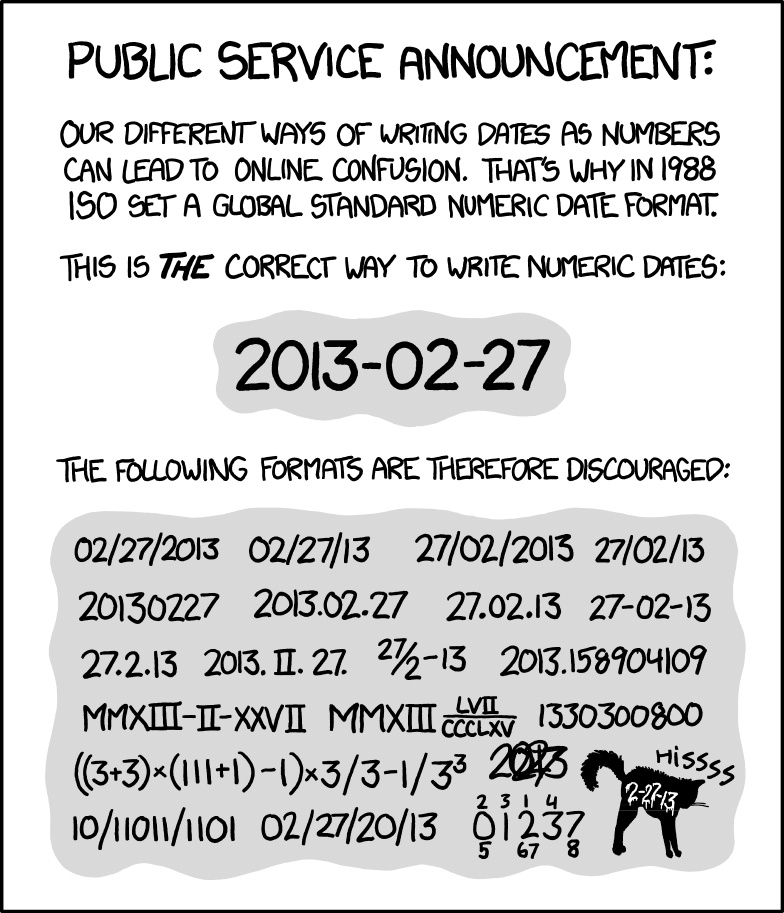
Can’t believe he missed the opportunity to add 41332 to the number of ways of how not to write dates.
I must be missing something.
Experience with excel.
I recall writing a script that produces that 01237 with smaller digits around it for the current date. It lists the numbers that occur in the date (0, 2, 3 and 9 for 2023-09-09), the smaller digits show at which position they show up in a YYYYMMDD format (the 0 shows up on positions 2, 5 and 7)
The script has not been pushed online cause it was so dang bad
I’m definitely in the “for almost everything” camp. It’s less ambiguous especially when you consider the DD/MM vs MM/DD nonsense between US dates vs elsewhere. Pretty much the only time I don’t use ISO-8601 is when I’m using non-numeric month names like when saying a date out loud.
It warms my heart to see so many comments in the camp of “I use it everywhere”. Absolutely same here. You are my people.
Together with hh:mm(:ss) for times and +hh:mm for timezones. Don’t make me deal with that 12am/pm bullshit that doesn’t make any sense, and don’t make make me look up just what the time difference is between CEST and IST. Just give me the offsets +02:00 and +05:30, and I can calculate that my local time of 06:55+03:30=10:25 in India.
Christ, do this many people really find iso8601 hard to read? It’s the date and the time with a T in the middle.
Not “many people.” Americans. Americans find it hard to read. I’m not 100% sure but I’m fairly certain everyone else in the world agrees that either day/month/year or year/month/day is the best way to clearly indicate a date. You know, because big to small. America believes month/day/year for some stupid fucking reason.
I’m pretty sure it’s because of the way we say it. Like, “May 6th, 2023”. So we write it 5/6/2023.
That said, I think it’s fucking stupid.
Yer, just like the most important day for the seppos… The 4th of July…
I will never stop being impressed by the absolute insanity that is British rhyming slang. Apparently I’ve never heard seppo before, short for septic tank, rhyming with Yank. I just learned a new mildy derogatory term for Americans, nice
I’m not an American and English isn’t my first language, so the US way to write dates always confused me. Now, I finally understand it! Many thanks, this is legitimately sooooo useful!
Day/month/year is not in the same category as y/m/d. That crap is so ambiguous. Is today August 9th? Or September 8th? Y/m/d to the rescue.
Because who cares what day it is without knowing the month first.
Who cares what month it is without knowing the year first
better than the absolutely deranged MM/DD/YYYY and imo the best when it comes to international communication
I’ve been told " You don’t say 6th June, do you?" too many times
In the U.K. we do all the same. Sixth of June.
In the US it’s about 50/50 sixth of June and June sixth.
How the fuck does second largest to smallest to largest make any kind of sense?
Year-Month-Day best everywhere
ISO-8601 over all other formats. 2023-08-09T21:11:00Z
Simple, sortable, intuitive.
Awful to actually read, though. Using T as a delimiter is mental… At least the hyphen provides some white space
Honestly, even a lowercase t.
Why are you splitting and delimiting a date object? Convert it to a shallower object if that’s what you need
While you are definitely right, I and many others use yyyy-mm-dd outside of software. And that’s when the T becomes super lame.
Using T as a delimiter is mental
You get used to it.
Good luck using colons in a filename.
Linux has been able to handle that since the 90s.
Tough luck if you are using NTFS file system. All my homies use EXT4.
btrfs/zfs > ext4
I really wonder how americans were able to fuck this one up. There are three ways to arrange these and two of them are acceptable!
Edit: Yes, I meant common ways, not combinatorically possible ways.
Hmmm more like 6 ways but I get your point
Twelve ways if you count two-digit years. My nephew was born on 12/12/12 which was convenient.
for the americans, that’s 12/12/12
To the commenters justifying the written form MM-DD-YYYY on the basis of preferring to say the name of the month followed by the day (which the written numerical sequence does not preclude you from doing). If someone were to say something like “the time is a quarter to eleven” do you think they would have a case for writing it 45:10? And if so, how would you deal with the ambiguity of “ten past ten” if they wrote it 10:10 instead of 10:10?
There are two ways of writting dates: the “yyyy-mm-dd” one and the wrong one
yyyy-mm-dd makes it much clearer about what fucking order things are in
Use YYYY-DD-MM for pure chaos.
ISO dates are the goat because they string compare correctly. Just yesterday I shaved 2 full seconds off a page transition by removing a date parse in the middle of a hot sorting loop. Everything should use ISO in my opinion.
Maybe we should form some sort of organization, on an international stage, dedicated to creating and maintaining such standards.



















